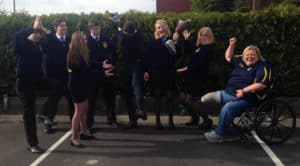By Ruvine Jiménez, Community Organizer, League of Education Voters Pasco Field Office

The Rural Counselor Network is a major milestone/deliverable of the Rural Alliance, which was first convened in July 2010 in Spokane with 35 founding rural school districts. In June 2016, several rural district superintendents and the Mary Walker School District initiated a strategic plan for the Rural Alliance. Together they have been able to attract new members and represent 79 districts, 46,000 students, 15 colleges/universities, and non-profit organizations.
The Rural Alliance mission is, “Partnering to increase options and opportunities for rural students, families and communities.” Their vision is. “Success for every rural student, family and community.” Their values are, “Student-Centered, Relationship-Based, Equitable, Innovative, and Inclusive.”
The Rural Counselor Network’s primary focus is to increase readiness for college, career, and life for all students, including growth in academic, career, and social-economic development.
The goals for the counselors are to:
- Share resources, information and tools to support college, career, and life readiness
- Engage in peer collaboration and mentoring to strengthen practice
If you would like to learn more, all of the above information is on their website.
On March 14, 2018, I had the opportunity to attend the inaugural Rural Counselor Network meeting in Spokane. I witnessed dedicated rural counselors gathering to learn, share, problem solve and network in the name of the students they serve in their rural districts. Michael McBride, Business and Industry Analyst of the Spokane Area Workforce Development Council, shared Career Projections & Trends for the Spokane area. One of the biggest takeaways from his presentation is that 7 out of 10 jobs require a technical level of education.
The panel on Best Practices for Career Awareness in Schools/Districts K-12 blew me away. Four panelists shared success stories from their school districts on job shadowing, career assessments, career technical education, and job experiences. While all four panelists did a phenomenal job, I would like to highlight one in particular.
Three of the panelists sat together, with a podium separating them from the other panelist. I thought it was strange that the fourth panelist was not with the other three. When the first three panelists gave their presentations on career technical education (CTE) experiences, High School and Beyond Plan, Saturday tutoring supports that students attended of their own free will, and the work they did for all K-12 students because they are small school districts, I was in awe. The fourth panelist, Jamey Jo Steele, shared similar activities including speed job shadowing, TEALS (Technology Education and Literacy in Schools) computer science class opportunities, and that she taught welding. When she mentioned she taught welding, that perked me right up.
What I could not tell from where I sat is that Jamey Jo was in a wheelchair, and that she works with a disability. That came to light when I approached to ask her about her pathway to teaching welding. When I noticed her physical challenges, I thought, “What student stands a chance to tell Jamey Jo, ‘I can’t do it?’” Actually, no one stands a chance, because Jamey Jo is an amputee. Jamey Jo sat in the front of the conference room as a panelist, away from the other three panelists sharing all the great career activities that she and Mansfield School District, along with the other panelists from Columbia, Brewster, and Waterville School Districts provide for the students they serve, as a shining example of what could be done if you set your mind to it.
Yes, small districts have some disadvantages, but they also have advantages that some large school districts do not have:
1) Personal relationships with the students and their families
2) They get to know every student by name
3) More ownership / buy-in of the student’s success
4) Role model / mentor to the student
The Rural Counselor Network meeting also gave me an opportunity to strengthen relationships with the rural school districts that League of Education Voters supports by learning more about them and helping them lift their voices to the powers that be. I look forward to attending the next Rural Counselor Network meeting.
Love what we do? Support our work
Want to find out the latest in education news in Washington? Subscribe to our newsletter
Want to learn more about League of Education Voters? Find out here